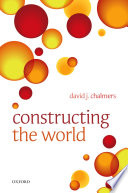

Most ebook files are in PDF format, so you can easily read them using various software such as Foxit Reader or directly on the Google Chrome browser.
Some ebook files are released by publishers in other formats such as .awz, .mobi, .epub, .fb2, etc. You may need to install specific software to read these formats on mobile/PC, such as Calibre.
Please read the tutorial at this link. https://ebooknice.com/page/post?id=faq
We offer FREE conversion to the popular formats you request; however, this may take some time. Therefore, right after payment, please email us, and we will try to provide the service as quickly as possible.
For some exceptional file formats or broken links (if any), please refrain from opening any disputes. Instead, email us first, and we will try to assist within a maximum of 6 hours.
EbookNice Team

Status:
Available0.0
0 reviews
ISBN 10: 0199608571
ISBN 13: 9780199608577
Author: David J Chalmers
David Chalmers develops a picture of reality on which all truths can be derived from a limited class of basic truths. The picture is inspired by Rudolf Carnap's construction of the world in Der Logische Aufbau Der Welt. Carnap's Aufbau is often seen as a noble failure, but Chalmers argues that a version of the project can succeed. With the right basic elements and the right derivation relation, we can indeed construct the world. The focal point of Chalmers' project is scrutability: the thesis that ideal reasoning from a limited class of basic truths yields all truths about the world. Chalmers first argues for the scrutability thesis and then considers how small the base can be. The result is a framework in "metaphysical epistemology": epistemology in service of a global picture of the world. The scrutability framework has ramifications throughout philosophy. Using it, Chalmers defends a broadly Fregean approach to meaning, argues for an internalist approach to the contents of thought, and rebuts W.V. Quine's arguments against the analytic and the a priori. He also uses scrutability to analyze the unity of science, to defend a sort of conceptual metaphysics, and to mount a structuralist response to skepticism. Based on Chalmers's 2010 John Locke lectures, Constructing the World opens up debate on central philosophical issues concerning knowledge, language, mind, and reality.
Chapter 1 Scrutability and the Aufbau
1 Primitive Concepts
2 Objections to the Aufbau
3 From Definitional to a priori Scrutability
4 From Descriptions to Intensions
5 The Scrutability base
6 Reviving the Aufbau
First Excursus: Scrutability and Knowability
Second Excursus: The Inscrutability of Reference and the Scrutability of Truth
Chapter 2 Varieties of Scrutability
1 Scrutability Theses
2 Sentences or Propositions?
3 Inferential Scrutability
4 Conditional Scrutability
5 A priori Scrutability
6 Generalized Scrutability
7 Idealization
8 Objections from Idealization
Third Excursus: Sentential and Propositional Scrutability
Fourth Excursus: Warrants and Support Structures
Fifth Excursus: Insulated Idealization and the Problem of Self-Doubt
Chapter 3 Adventures with a Cosmoscope
1 A scrutability base108
2 The Cosmoscope Argument
3 The Argument from Elimination
4 The argument from knowability
5 Inferential Scrutability with a Cosmoscope
6 Conditional Scrutability
7 The Objection from Recognitional Capacities
8 The Objection from Counterfactuals
Sixth Excursus: Totality Truths and Indexical Truths
Chapter 4 The Case for A Priori Scrutability
1 From Conditional to A Priori Scrutability
2 The Argument from Suspension of belief
3 The Argument from Frontloading
4 Causal roles, Mediating roles, and Justifying roles
5 Generalized A Priori Scrutability
6 Objections from self-knowledge
7 Objections from Theories of Concepts and Reference
8 Objections from Acquaintance and from Nonpropositional Evidence
9 The Objection from Empirical Inference
Seventh Excursus: Varieties of Apriority
Eighth Excursus: Recent Challenges to the A Priori
Chapter 5 Revisability and Conceptual Change
1 Introduction
2 The Arguments of ‘Two Dogmas’200
3 Carnap on Intensions
4 A Carnapian Response
5 Refining Carnap’s account
6 A Bayesian Analysis of holding-true
7 A Bayesian Analysis of Revisability
8 Quinean Objections
9 Conclusion
Ninth Excursus: Scrutability and Conceptual Dynamics
Tenth Excursus: Constructing Epistemic Space
Eleventh Excursus: Constructing Fregean Senses
Chapter 6 Hard Cases
1 Introduction
2 Mathematical truths
3 Normative and Evaluative truths
4 Ontological truths
5 Other Philosophical truths
6 Modal truths
7 Intentional truths
8 Social truths
9 Deferential terms
10 Names
11 Metalinguistic truths
12 Indexicals and Demonstratives
13 Vagueness
14 Secondary Qualities
15 Macrophysical truths
16 Counterfactual truths
17 Conclusion
Twelfth Excursus: Scrutability and the Unity of Science
Chapter 7 Minimizing the Base
1 Introduction
2 Heuristics
3 Microphysical Expressions
4 Color, other Secondary Qualities, and mass
5 Spatiotemporal Expressions
6 Causal and nomic Expressions
7 Phenomenal Expressions
8 Compression using laws
9 Quiddities
10 Other Expressions
11 Packages
Thirteenth Excursus: From the Aufbau to the Canberra Plan
Fourteenth Excursus: Epistemic Rigidity and Super-Rigidity
Chapter 8 The Structure of the World
1 Principled Scrutability bases
2 Definitional Scrutability (and Conceptual Analysis)
3 Analytic and Primitive Scrutability (and Primitive Concepts)
4 Narrow Scrutability (and narrow Content)
5 Acquaintance Scrutability (and Russellian Acquaintance)
6 Fundamental Scrutability (and the mind–body problem)
7 Structural Scrutability (and Structural Realism)
8 Generalized Scrutability (and Fregean content)
Summation: Whither the Aufbau?
Fifteenth Excursus: The Structuralist Response to Skepticism
Sixteenth Excursus: Scrutability, Supervenience, and Grounding
Seventeenth Excursus: Explaining Scrutability
Glossary
Tags: David J Chalmers, Constructing, World